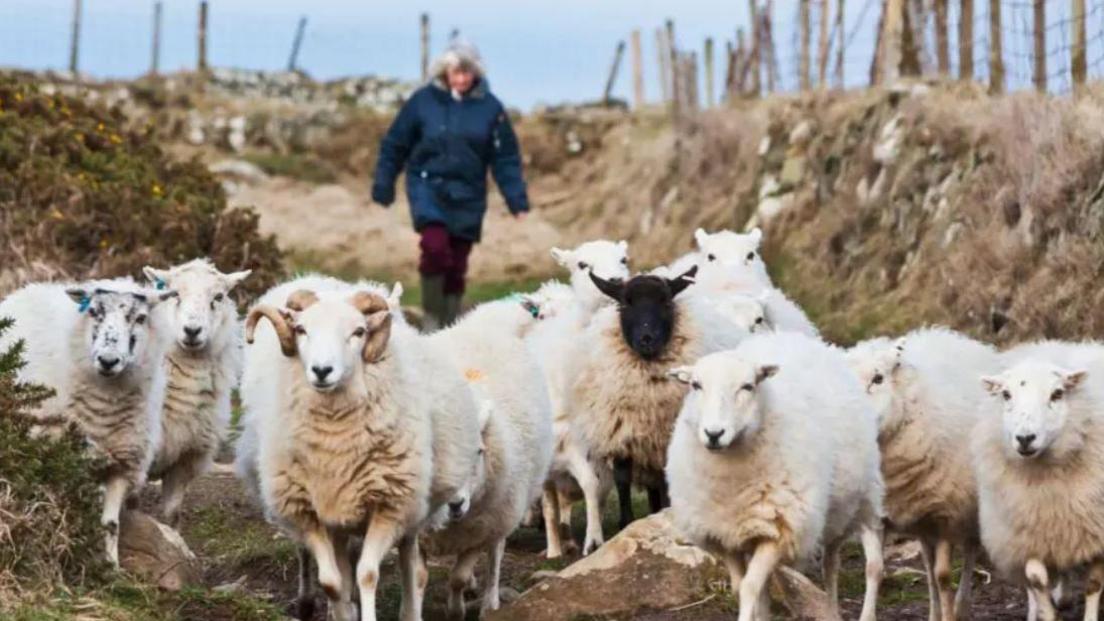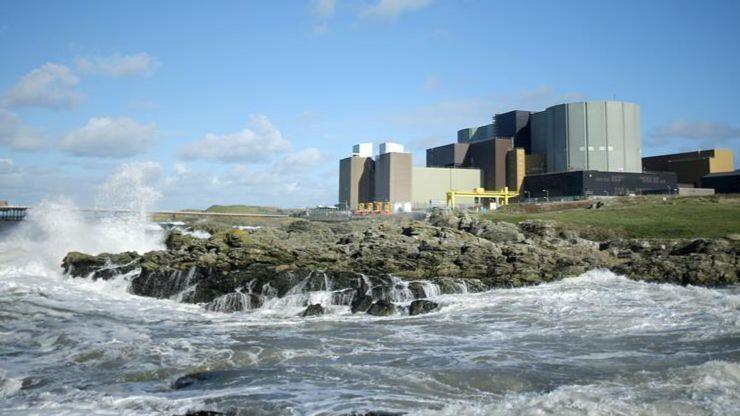Farming inheritance tax causing uncertainty and confusion - MPs

A cross-party group of MPs believe the new tax rules do not take into account Welsh-specific issues
- Published
Inheritance tax changes for farmers have created a "climate of uncertainty and confusion" and should be delayed, according to a group of MPs.
In a report, the cross-party Welsh Affairs Committee wants a Wales-specific impact assessment before implementing the changes due to come into effect in April 2026.
It accused the UK government of acting like it "doesn't seem to care about Welsh farmers", while one accountant said changes will affect about 92% of farmers, not the predicted 7%.
An HM Treasury spokesperson said it was "backing British farms" by investing funds for machinery, sustainable food and action to cut EU export costs.
How are the inheritance tax rules changing?
- Published19 November 2024
How many farms will be affected by Budget tax rises?
- Published10 December 2024
The plans to tax inherited agricultural assets worth more than £1m at a rate of 20% were announced in Chancellor Rachel Reeves' first Labour Budget last year and led to protests around the UK.
The warning on Wednesday comes a fortnight before the next Budget.
"At the moment the government doesn't seem to care about Welsh farmers, and we're asking them to take account of the differences in Wales and halt the taxes until a full impact assessment can be made," said chairwoman of the committee, Ruth Jones MP.
"We're not saying no to reform, we don't want wealthy landowners getting off their taxes.
"But our farms are by and large not wealthy tax evaders, they are farms made by families and for families."
The Newport West and Islwyn Labour MP said while some of the wording of the report may be "harsh", it is "accurate".
She also said the committee was asking the Welsh government to ringfence agricultural funding "because farmers need to know what's coming down the track".
The committee said the UK government had "a complacent approach" to the changes it was bringing in, adding that it was a "prime example" of UK policy overlooking "the distinct nature" of farming in Wales.

Janet Collins believes the new rules could affect far more farmers than predicted
The committee also claim that as no data was published about the number of farms in Wales that would be affected, the "vacuum" was filled by organisations publishing their own statistics offering "starkly different" estimates of the likely impact.
The UK government has said the changes will only affect the wealthiest 500 farms each year, but unions have estimated up to 70,000 farmers could be affected.
"We feel in our practice about 92% of people will be affected, and they're talking about 7%," said Janet Collins, director of LHP Accountants in Carmarthen.
"So are they going to be seriously listening to the agricultural professionals, and indeed the farmers themselves?
"If it's going to be done properly, it's worth it."
She said unless this happens, it was "kicking can the down the road".
Peter Rees and his family have run a dairy farm in Llangadog, Carmarthenshire, since the 1960s, as well as a touring caravan park and more recently a wedding venue.
"That's actually sustained the farm and helped us develop the farm," he said.
He said the investment was "coming back to bite us now because obviously it adds to our capital value".
"The next generation of our family want to come into the farm, want to sustain the business," he said, adding that the changes had created pressure because "we have to make decisions differently".
"We were following the advice we had prior to the potential introduction of the new tax.
"It's not as if we were complacent, it's not as if we weren't planning for it. But it's a different plan we have to put in place now and we have to do it quickly," he said.

Peter Rees now uses part of his farm as a wedding venue
The committee suggests the UK government could start "building bridges" with Welsh farmers by pausing the planned changes so a "proper comprehensive assessment" can be published and scrutinised by its members.
It demands the UK government recognises the "unique cultural, environmental and economic circumstances of farming in Wales" when making policy decisions and recommends that in future the Wales Office leads impact assessments alongside whichever department is implementing changes.
Ann Davies MP, Plaid Cymru's agriculture spokesperson, said the party opposed the changes from the start "warning that the failure to assess their impact on Welsh communities would cause real harm".
"The UK government's complacency and lack of Welsh data have created uncertainty and confusion," she said.
"The upcoming Budget must right this wrong - listen to the Welsh Affairs Committee's recommendations and pause these reckless reforms until their impact has been fully assessed."
David Chadwick MP, Welsh Liberal Democrat Westminster spokesperson, said the UK government must "urgently rethink its approach" to the family farms tax.
"There are practical, fair alternatives on the table that would close loopholes exploited by large multinationals, without inflicting the devastating harm this policy would cause to our rural economy and communities."
The Welsh government thanked the committee and said it "will note its conclusions".
A Treasury spokesperson said it was "backing British farms" with the Annual Investment Allowance "for plant and machinery investments, billions for sustainable food and action to cut EU export costs".
"Right now 40% of Agricultural Property Relief - worth £219m - goes to just 117 estates. Our reforms will channel that funding into vital public services."
More top stories
- Published1 day ago

- Published1 day ago

- Published1 day ago
